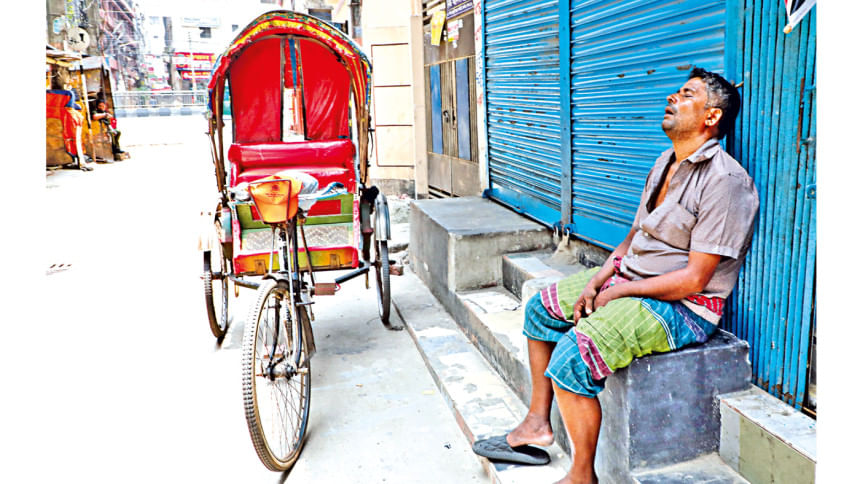At dawn, when Dhaka is just beginning to stir, thousands of rickshaw pullers set off on their daily grind. Their cycle rickshaws ferry millions across the capital each day, keeping the city moving. Yet these human engines of Dhaka's transportation system endure a punishing existence: inhaling toxic air, labouring under searing heat, and driving their bodies to exhaustion. Behind their contribution to urban life lies a silent health crisis that goes largely unseen, unheard, and unaddressed.
From rural roots to urban struggle
Most rickshaw pullers are rural migrants, drawn to Dhaka by poverty, displacement, or the hope of a better life. With little education or training, rickshaw pulling becomes one of the few options for survival. According to Ariful Islam Nadim, General Secretary of the Rickshaw, Van, Easy Bike Labourer Union, the city is home to nearly one million auto-rickshaw and 60,000–80,000 paddle rickshaw pullers.
Their battle is not only against Dhaka's chaotic traffic but also against broken bodies, empty stomachs, and a system that refuses to acknowledge them.
Poisoned air
Dhaka consistently ranks among the most polluted cities in the world. For rickshaw pullers, who spend 10–12 hours a day exposed to traffic fumes, the risks are severe.
Dr Ahmad Kamruzzaman Majumder, of Stamford University's Department of Environmental Science, describes them as "among the top two or three most vulnerable groups in Dhaka." He notes that migration to the city results in health deterioration by 77 percent, and with age, rickshaw pullers lose up to 50 percent of their lung capacity.

Body in strain
Rickshaw pulling is physically gruelling. Prolonged exertion under extreme heat leaves pullers at risk of dehydration, heatstroke, and musculoskeletal disorders. A 2021 survey by Prime Asia University, led by Dr Rumana Rashid, found that nearly half of rickshaw pullers suffered from joint pain, 46 percent from headaches, and over 40 percent from fever.
Only 38 percent manage to drink more than three litres of water daily, and access to clean water remains a privilege rather than a right.
Dr Rashid adds: As they age, they cannot work the same hours, so the family loses even the bare minimum security. Out of desperation, they return to the streets, and the cycle of suffering continues.
Unable to cope with relentless physical strain, many turn to tobacco, alcohol, or other stimulants—short-term escapes from long-term misery.
Poverty and Malnutrition
Malnutrition and poverty form a vicious trap. Rickshaw pullers often subsist on rice with vegetables or curry, with eggs a couple of times a week and meat perhaps once.
Take the story of 75-year-old Md Shiraj, who has been pulling rickshaws for 35 years around Motijheel. Earning Tk 500–600 a day, he eats twice daily and suffers from untreated abdominal disease. Yet, he continues to pedal, compelled by duty to provide for his family.
Surveys confirm that their dietary habits remain dominated by rice, with little nutritional diversity. Spending long hours on the streets, many fall back on cheap junk food, further compromising their health. Excluded from formal healthcare, they often rely on pharmacies, while preventable diseases—diarrhoea, hepatitis, and other infections—spread unchecked.
Trapped by exploitation
Beyond health, economic exploitation further weakens rickshaw pullers' lives. Many rent their vehicles from garages under exploitative terms. "The garage rental system is one-sided," says AKM Nasim, Country Director of the Labour Law Institute and member of the Labour Reform Commission. "The rates are fixed by garage owners, and pullers have no say. If they cannot pay, they lose their rickshaw."
Abandoned by the system
Perhaps the most brutal aspect of this crisis is the absence of protection. Rickshaw pullers fall outside Bangladesh's 2006 Labour Law, which covers only the formal sector. As Nasim points out, "Like 85 percent of informal workers, rickshaw pullers have no legal safeguards. Policymakers ignore them because their economic contribution is undervalued and they lack political representation."
Even their unions face repression. Nadim of the Rickshaw, Van, Easy Bike Labourer Union recalls, "Before July of last year, our members were under constant attack, lawsuits, and extortion by political leaders. These problems are returning, and we are powerless to resist. The government must bring these workers under regulation."
Searching for solutions
Despite the bleakness, there are glimmers of hope.
The Labour Reform Commission, meanwhile, is pushing to extend labour protections to the informal sector, while union leaders continue to demand formal recognition. "Without legal coverage, rickshaw pullers will remain trapped in exploitation," stresses Nasim.
Dr Kamruzzaman suggests creating dedicated lanes for non-motorised vehicles to reduce occupational hazards. He stresses the need for licensing, training, and health support systems. "Policies are meaningless without implementation," he warns.
Dr Rashid recalls a low-cost nutritional innovation developed during her tenure at the Bangladesh Council of Scientific and Industrial Research: a powdered vegetable mix designed for labourers like rickshaw pullers and garment workers. Though the project stalled, she urges the food industry to revisit such ideas to improve workers' diets.
An invisible crisis
Rickshaw pullers embody resilience. They power Dhaka's daily life, yet remain invisible in its policy landscape. Their labour builds the city's mobility, but their bodies and health are left to crumble.
Dhaka's air poisons their lungs. Heat batters their strength. Poverty robs their nutrition. And the state denies them protection.
If Bangladesh is serious about inclusive development, it cannot afford to overlook this silent health emergency. Recognising rickshaw pullers as workers, extending legal coverage, ensuring access to healthcare, and investing in nutrition are not acts of charity—they are matters of justice.
Ystiaque Ahmed works at The Daily Star.


Comments